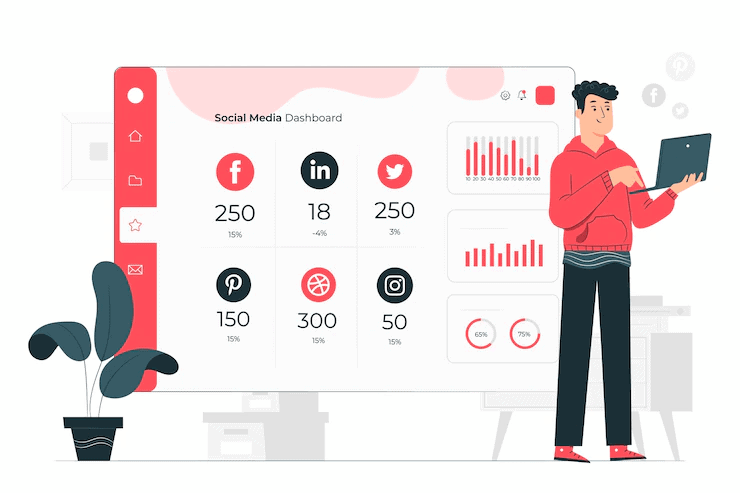Social networking sites have seen incredible growth for nearly two decades, and the pandemic gave way to increased usage. “Like, Share, and Comment” – these are the common phrases you’ll find from Gen Z, Millennials, and Alphas.
Here are some mind-blowing statistics according to Hootsuite regarding social media:
- On average, 13.5 users joined social platforms every second in 2021.
- Around 75% of the world population age 13 or more uses social networking applications.
- Furthermore, 93% of internet users log in to their social accounts.
- People spend an average of two and half hours on social networking platforms worldwide.
[playht_player width=”100%” height=”175″ voice=”Mark”]
These usage numbers can help to understand the emergence of social networking tools and how you can better leverage social media in your business.
Involvement Of Businesses
As we all know, businesses explore all options when it comes to marketing their products.
Social communication tools are influencing business practices also. For example, numerous organizations make and manage social media accounts to keep in touch with their consumers and build brand awareness among new and potential customers.
Companies often provide information regarding new products, features, pricing, events, special offers/deals, and important announcements on social networking sites to ensure the information gets maximum reach.
Providing information is one thing, but the first and most important element is choosing the right social platform for the business. Companies look for the most efficient medium with a significant number of active users to spread awareness about the product who fall into their target market.
Numerous platforms are there to select from – LinkedIn, Facebook, Instagram, Youtube, Twitter, Reddit, Pinterest, Quora, and the list goes on. These sites help businesses evolve customer feedback processes and improve the product. In addition, platforms with the most active users can present an understanding of brand perception and customer sentiment.
Social media marketing trends is one fastest growing web search in the context of businesses. An influential presence in the digital world is a noteworthy achievement for any company. Moreover, it has emerged as a way for companies to get ahead of the competition.
Social media marketing research by Sproutsocial stated that:
- 55% of consumers seek out new brands through social networks.
- Furthermore, 78% of shoppers are keen to purchase from them after having a favorable social experience with companies.
- In addition, 72% of businesses use social data to inform critical decisions.
Social data is the leading information source to involve customers according to their choices. However, industries weren’t utilizing it until recently to its greatest potential, but recently social sites are witnessing a shift.
Emergence Of Social Media Marketing
Social media marketing is not just about publishing on different platforms; it is a broader term – building an audience persona, setting goals & objectives, budgeting, resourcing, making the team, doing research, selecting the proper platform, creating the content, and tracking the progress with analytics/insights. To cut down your efforts, you can use social media marketing tools available in the market.
So, a company should have an effective social strategy to rely upon. Some important terms that businesses should understand are as follows:
- Content: Whatever the business posts on social platforms is called content. It can be a post, status update, or video. It contains numerous forms, and tailoring is necessary according to different platforms.
- Context: In some ways, context is even more important than the content. The context influences the meaning of the context and makes it more relevant for the targeted audience and interesting for them.
- Hashtags: Hashtags usually work as a wild card to get quicker information about any term, event, or incident. Almost every platform allows hashtags and marks the content as a part of the current trend. It makes the content easy to discover, and this way, it is more likely to get shared.
- Share: Share can be called the official currency of the social community. It is the measurement of how many people loved the content and decided to share it with their audience.
- Engagement: It is a measurement of total interacted people. Likes, comments, reactions, or shares – everything counts in engagement.
There are numerous ways to market one’s product in the social community, but very few are helpful and practical that can deliver expected results. Popular methods for social marketing include content marketing, ad makers, influencers, paid media, forum posting, and reviews.
Social marketing has gained momentum in recent times and gathered much attention from the businesses that are not even using it. This way, we can say that social marketing is the future for reaching a targeted audience. And this is because social platform usage is growing daily; around 2 billion people are online at any given time. And approximately 53% of active individuals on social networks are following a brand.
5 Ways To Leverage Social Media

Image(Source)
Apart from other digital marketing techniques, businesses can make more efforts to make their social presence much more effective. There are different ways in which companies can leverage social platforms.
1. Focus On Trends And Act Relevantly
Follow the latest trends, and one can easily get in front of their target audience. For example, users may find a business more trustworthy if their social media feed is full of posts created by the particular company.
Enabling customer service is the current trend on social platforms; it can be a good idea to get more consumers engaged. Moreover, specific popular formats of posts can be followed like short videos are most likely to get more viewers, likes, and shares than other formats.
Organizations discover topics by exploring hashtags, spending time on social platforms, engaging with customers, listening to podcasts, and also they predict future trends based on current situations/events.
2. Respond And Reward Your Consumers On Social Media
As mentioned earlier, social platforms are the bridge between customers and the company. Consumers provide their feedback regarding the product, and the business take it into consideration to use in future decisions. Of course, some businesses don’t involve themselves in social communities just because of a fear of having negative reviews about their enterprise or product, but that’s probably not a smart move.
Businesses must respond to the customers who provide their time to engage with the business. Being responsive makes them more involved with the brand.
In addition, rewarding the customers with discounts, special offers, or recognition helps to build the authoritativeness of the business on a particular platform. It creates customer brand loyalty and keeps them hooked towards the company.
3. Create A Community
The contrast between an ever-growing and increasingly connected fan base and a social channel fade into the background. An engaging social community helps the business to stay in the conversation.
The very first step to building a community is to know the targeted audience and their mindset. Analyzing consumer preferences can help to make crucial decisions regarding the product/service. The second is to ask the right questions and listen to customers concerns. By asking product/service-related questions, businesses can prove their involvement in the process of development. The final step is to answer their questions. This reduces customer churn rate and increases customer satisfaction.
4. Stay Focused On Customer Service On Social Media
As mentioned before, customer service on social media is the new normal for businesses. Even companies different strategies are made to deliver the best customer service.
Customers turn to social sites for providing reviews regarding the product/service, no matter positive or negative. It’s up to the customer response team to solve their concerns and deliver the a satisfactory experience.
The consumer response team can be strengthened by setting clear standards for them. For example, each team member should have the ability to even turn negative customers into positive ones by solving their queries. The quality of your customer service heavily influences the way consumers feel about your brand.
5. Analytics And Insights

Image(Source)
Social platform analytics are often used as a medium for accessing the customer’s engagement. There are various techniques involved in analytics containing different frameworks.
Social media analytics aid in the comprehension of your information, resulting in increased user acceptability. For example, you’ll be able to see which posts received the best feedback this way, and you’ll be able to improve on that line of content. Numerous platforms enable insights and analytics features for business accounts.
It helps businesses decide their digital branding strategy and influence the way an organization engages with customers.
Benefits Of a Social Presence For Businesses
Social media’s power has been obvious – and it is just going to get stronger in the coming years.
It delivers numerous advantages to an organization enhancing their productivity. Such benefits are stated below to consider.
Easy And Faster Communication With Customers
Businesses can effectively deliver their message to their target audience in less time. They can also receive feedback, reviews, and questions from customers quickly to solve them.
The communication channel still contains different challenges, but some of them are eliminated in social communication.
Messages, announcements, updates, and responses to queries can be delivered to customers with clear meaning. On the other hand, consumers can contact the customer service representative faster than before and describe their problem or question.
Manages Reputation
As discussed above, social platforms help to make the business an authoritative place in the market and create brand loyalty of customers.
The presence of the company on social networks and maximum involvement make a compelling image and reputation. In addition, solving concerns, offering discounts/offers, and rewarding consumers build a healthy reputation for the business.
Generating Leads
Social networks have a massive amount of users and interactions among them. That’s why it is an effective tool for generating leads directly or indirectly.
Numerous companies have evolved towards a paid and marketing aspect of a network to generate optimum leads. In addition, innovations are often made to make new opportunities for leads and marketing of products.
Social tools enable a CTA (Call To Action) for business accounts landing on their home page or product pages. This makes the customers get the latest information about the product and offers.
Boost Web Traffic
Social media is designed to reach out to a variety of audiences in a friendly, helpful, and interesting manner, as well as recommend potential clients you may not have had the opportunity to meet before to learn about and try your service.
There are numerous methods for attracting users to a company website for beneficial, practical reasons. Allow social media to be the vehicle that facilitates this.
Helps In Tracking Competitors
As said before, numerous organizations are on social. As a result, businesses can check their competitors social presence and analyze their progress.
To stay compliant with the market, businesses also need to keep an eye on other companies activities. Social platforms help them to do so. The company can take important decisions and make changes in policies according to other service providers and their services.
Customer Satisfaction
One of the benefits of social media for businesses is that it gives them a direct route to their clients, allowing them to interact with them in real-time.
Companies responding quickly to customer concerns are more likely to drive the best customer experience and provide more satisfaction than companies that don’t take advantage of social platforms this way.
Customer satisfaction influences the future sales of businesses; that’s why it is essential to deliver the best customer experience and satisfaction.
Improves The Creativity Of Products
Businesses can receive reviews, feedback, and suggestions from customers regarding the product/service. This way, they can know what is happening in customers minds.
Every person thinks in a unique manner, so all suggestions made by the consumers can be different. However, if the organization finds a consumers suggestion helpful in implementing new features, it will save time for executives. This improves the productivity and creativity of the company.
Leverage Social Media for Your Business
We went through the social platforms usage, its emergence in recent times, social marketing, and ways to leverage it for businesses.
By discussing this, we can agree that social media is important to the future of businesses, and it will be difficult to run marketing operations without relying on it.

